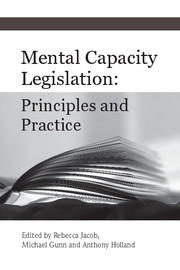2 - The assessment of mental capacity
Published online by Cambridge University Press: 01 January 2018
Summary
Psychiatrists are most likely to be called upon to assess mental capacity when a decision relates to treatment or care relating to a patient's general medical condition. This may include medical treatment or the setting in which care is provided. However, psychiatrists are also sometimes asked to assess testamentary capacity: the capacity of a person to run their affairs, or the capacity to form a contract, including marriage. For most of this chapter I will focus on capacity related to treatment decisions. The same principles apply for other decisions.
When to assess mental capacity
The first principle of the Mental Capacity Act 2005 (MCA) is that capacity should be presumed. However, decision-making difficulties are common both in patients with psychiatric disorders (Bellhouse et al, 2003; Cairns et al, 2005a; Owen et al, 2008) and in general medical settings (Raymont et al, 2004). When is it legitimate to question mental capacity and make an assessment? In practice, mental capacity is called into question in three main circumstances:
• when a patient with a known disorder that might impair decisionmaking (dementia, intellectual disability or severe mental disorder) faces an important decision, where consent is usually explicitly sought
• when a person (with or without known difficulties) makes a decision that seems surprising or unwise
• when a third party (e.g. a relative) raises concerns that the person lacks capacity.
The presumption of capacity places the onus on the agency making the assessment to demonstrate its absence, and the MCA and its Code of Practice (Department for Constitutional Affairs, 2007) are explicit in stating that mental capacity is not to be doubted simply on the basis of an individual's appearance or diagnosis. The point of this principle is clear, and represents the hard-fought battles of groups speaking for people with disabilities to ensure that vulnerable and stigmatised groups have a voice in decision-making. The burden of proof for assessing that someone is lacking capacity is on the ‘balance of probabilities’.
The MCA also states (in its third principle) that capacity should not be called into question simply on the basis that a decision appears to be unwise: people are at liberty to make unwise or eccentric decisions.
- Type
- Chapter
- Information
- Mental Capacity LegislationPrinciples and Practice, pp. 15 - 32Publisher: Royal College of PsychiatristsPrint publication year: 2013

